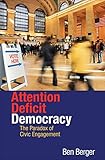Attention Deficit Democracy : The Paradox of Civic Engagement / Ben Berger.
Material type: TextPublisher: Princeton, NJ : Princeton University Press, [2011]Copyright date: ©2012Edition: Course BookDescription: 1 online resource (224 p.) : 2 line illus. 2 tablesContent type:
TextPublisher: Princeton, NJ : Princeton University Press, [2011]Copyright date: ©2012Edition: Course BookDescription: 1 online resource (224 p.) : 2 line illus. 2 tablesContent type: - 9780691144689
- 9781400840311
- Democracy
- Political participation -- United States
- POLITICAL SCIENCE / Political ideologies / Democracy
- Alexis de Tocqueville
- Hannah Arendt
- attention deficit
- attention
- civic engagement
- civil associations
- democracy
- energy
- instrumental good
- instrumental value
- intrinsic good
- intrinsic value
- invisibility
- isolation
- liberal democracy
- materialism
- moral engagement
- participatory democracy
- political apathy
- political associations
- political education
- political engagement
- political governance
- political institutions
- political mobilization
- politics
- public freedom
- public philosophy
- self-interest
- social engagement
- totalitarianism
- township administration
- 323.0420973 23
- JK1764 .B465 2017
- online - DeGruyter
- Issued also in print.
| Item type | Current library | Call number | URL | Status | Notes | Barcode | |
|---|---|---|---|---|---|---|---|
 eBook
eBook
|
Biblioteca "Angelicum" Pont. Univ. S.Tommaso d'Aquino Nuvola online | online - DeGruyter (Browse shelf(Opens below)) | Online access | Not for loan (Accesso limitato) | Accesso per gli utenti autorizzati / Access for authorized users | (dgr)9781400840311 |
Frontmatter -- Contents -- Preface -- Chapter 1. Introduction -- Chapter 2. The rules of engagement -- Chapter 3. Political Engagement as Intrinsic Good: Arendt and Company -- Chapter 4. Political Engagement as Instrumental Good: Tocqueville, Attention Deficit, and Energy -- Chapter 5. Is Political Engagement Better Than Sex? -- Chapter 6. Conclusion: Tocqueville vs. the Full Monty -- Bibliography -- Index
restricted access online access with authorization star
http://purl.org/coar/access_right/c_16ec
Handwringing about political apathy is as old as democracy itself. As early as 425 BC, the playwright Aristophanes ridiculed his fellow Athenians for gossiping in the market instead of voting. In more recent decades, calls for greater civic engagement as a democratic cure-all have met with widespread agreement. But how realistic--or helpful--is it to expect citizens to devote more attention and energy to politics? In Attention Deficit Democracy, Ben Berger provides a surprising new perspective on the problem of civic engagement, challenging idealists who aspire to revolutionize democracies and their citizens, but also taking issue with cynics who think that citizens cannot--and need not--do better. "Civic engagement" has become an unwieldy and confusing catchall, Berger argues. We should talk instead of political, social, and moral engagement, figuring out which kinds of engagement make democracy work better, and how we might promote them. Focusing on political engagement and taking Alexis de Tocqueville and Hannah Arendt as his guides, Berger identifies ways to achieve the political engagement we want and need without resorting to coercive measures such as compulsory national service or mandatory voting. By providing a realistic account of the value of political engagement and practical strategies for improving it, while avoiding proposals we can never hope to achieve, Attention Deficit Democracy makes a persuasive case for a public philosophy that much of the public can actually endorse.
Issued also in print.
Mode of access: Internet via World Wide Web.
In English.
Description based on online resource; title from PDF title page (publisher's Web site, viewed 29. Jul 2021)


